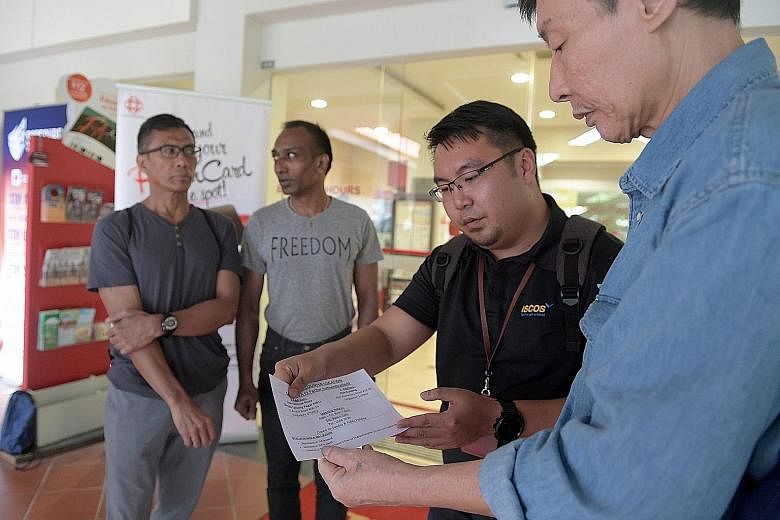After 12 years behind bars, Arthur (not his real name) returned to the Tampines three-room flat he shared with his mother last month.
He was struck by the changes around Singapore.
"There were no casinos back then, and mobile phones are so different now," he said.
To help former offenders like Arthur reorientate themselves in society, the Industrial and Services Co-operative Society (Iscos), a non-profit group, launched Project ReConnect.
Since April, Iscos has run day-long tours about once every fortnight for those who have spent three or more years in jail. Conducted within two weeks of inmates' release, Iscos helps them sign up for their SingPass accounts and collect the 2FA tokens needed to use them.
Participants are also taken to places such as MRT stations to help them get used to crowds and familiarise themselves with new train lines. They are also shown how to top up their ez-link cards.
Arthur, who is in his 50s, is one of 86 ex-offenders who have participated in the project.
Experts said ex-inmates aged 40 and above have a harder time assimilating after their release.
Prison statistics show there were over 5,700 inmates aged 40 and above held for penal offences last year. And the number aged above 60 has been climbing since 2010, more than doubling from 243 then, to about 650 last year. This makes up around 5.4 per cent of the total prison population.
Iscos deputy director Elvis Overee, 52, said: "The first three months after release are a critical period of adjustment... the first step is to orientate them and the second, to give them support through our other services."
He added that Iscos' programme is structured, and introduces participants to its support groups, as well as job and training opportunities.
Besides Iscos, some halfway houses and other non-profit groups conduct similar programmes. Mr Muhammad Sufian Mohd Salim, deputy head of Pertapis Halfway House, said that since 2014, all its residents have been through something similar within the first month of moving in. Pertapis has about 150 residents per year.
He added that it is harder for older residents to reintegrate: "We're not so worried about the younger offenders; it's easy for them to form their own support groups."
About half of residents are aged above 40, and around 30 per cent received long-term sentences of at least five years, he said.
While halfway house The Helping Hand does not have a formal orientation, its chief executive Chia Shih Sheung said case workers have been helping residents get used to daily life out of prison. Half of the 80 clients it houses are aged above 40.
Singapore Anti-Narcotics Association executive director Abdul Karim said it intends to refer clients who need orientation to Iscos. "The programme is beneficial, and the ageing prison population is a factor," he said. "The older generation may need it as technology, and demands of jobs are changing rapidly."
Ms Janet Wee, a former senior drug counsellor who now heads Acorn Quest, a firm running counselling services for ex-offenders, said: "Some share with us that when they are standing in a bus or train, they feel that people stare at them, as though aware that they are former inmates.
"When we accompany them around for a start, it gives them confidence. Their fear and anxiety go down, and when they start working, they cope better."
Arthur said that to cope, he has been getting to know his neighbourhood again.
"Since my release, I've been trying to get used to my environment, by walking around my neighbourhood and visiting places like the foodcourts, coffee shops and malls nearby."
For Mr Arulandu-Devasagayan, 47, who was also released from jail in late August and took part in Project ReConnect, it was more than a source of practical assistance.
"It shows us that they have hope in us, and believe that we can be good citizens," he said.


